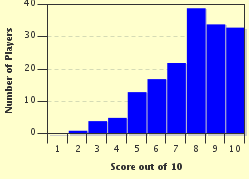Quiz Answer Key and Fun Facts
1. In 1974 journalists Carl Bernstein and Bob Woodward of the Washington Post published "All the President's Men", a landmark of investigative reporting. Their efforts led to the resignation of President Richard Nixon. Much of the information they gathered was from an unnamed source. What did the call this person?
2. James Alan Bouton wrote and published "Ball Four" in 1970. What was his background?
3. When history is told, most often it is from the perspective of the dominant culture. So it is with the history of the American West. Dee Brown's "Bury My Heart at Wounded Knee" changed that. With detailed research he told the American Indians' side of the struggles. Where would I go to visit Wounded Knee?
4. On the best seller list in 1970 was David Reuben's "Everything You Ever Wanted to Know About Sex". What was the sub-title?
5. "All Creatures Great and Small" (1972), "All Things Bright and Beautiful" (1974), and "All Things Wise and Wonderful"(1977) were all best sellers during the 1970s. What was the subject of these books?
6. Thomas Anthony Harris' book "I'm OK, You're OK" dominated the New York Times best seller list for two years. What was the psychological theory on which Harris based his book?
7. "Roots" caused a sensation in the 1970s. Both the book and the television mini-series cross-fed each other as the book won the 1977 Pulitzer Prize and the television series won nine Emmys and a Peabody. A million and a half copies were sold in the first few months. The book was placed in the non-fiction classification. However, it was later removed because of questionable research, plagiarism issues, and historical inaccuracies. True or False?
8. "The Book of Lists" (1977) was a family project. The son, assisted by his father and his sister, compiled interesting lists long before David Letterman. The son used the family name of Wallechinsky. What pen name did his father and sister use?
9. "Passages" (1976) was on The New York Times Bestseller List for three years and was translated into 28 languages. The Library of Congress named "Passages" one of the ten most influential books of our times. "Passages" details the changing landscape we face as we age and change, and how we might adapt to these situations. What popular journalist wrote "Passages?"
10. "Just Wait Until You Have Children of Your Own (1971),"I Lost Everything in the Post-Natal Depression" (1974), "The Grass is Always Greener Over the Septic Tank" (1976), and "If Life is a Bowl of Cherries, What Am I Doing in the Pits?" (1978) - who wrote these wildly popular humorous books?
Source: Author
Rehaberpro
This quiz was reviewed by FunTrivia editor
looney_tunes before going online.
Any errors found in FunTrivia content are routinely corrected through our feedback system.


